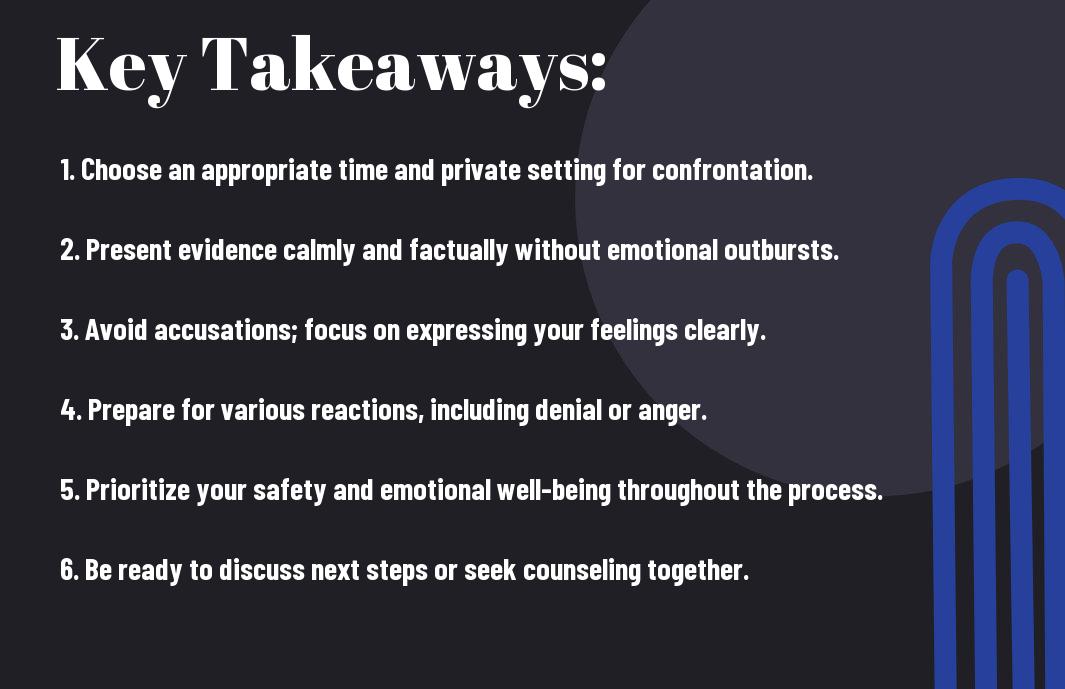With the emotional turmoil that comes from suspecting infidelity, it’s vital to approach the situation thoughtfully. You may find yourself wrestling with the decision to confront your partner about your suspicions. This blog post outlines 12 effective strategies to present your evidence in a constructive manner, helping you navigate this challenging conversatio . These tips aim to empower you as you seek clarity and understanding. Contact Digital Forensic Squad for personalized guidance on how to confront a cheating spouse.
Key Takeaways:
- Approach the conversation with sensitivity, ensuring that both parties feel safe and respected while discussing the evidence of infidelity.
- Be prepared for various reactions; your partner may respond with shock, denial, or anger, so it’s important to remain calm and compassionate throughout the discussion.
- Present evidence factually and objectively, avoiding personal attacks or emotional confrontations, to encourage open dialogue and facilitate understanding.
Understanding Infidelity
Your understanding of infidelity is imperative for addressing the complexities of betrayal within a relationship. Infidelity can often lead to feelings of confusion and heartbreak, making it critical to comprehend the underlying issues. By examining the various facets of infidelity, including its emotional and physical dimensions, you will be better equipped to navigate the difficult conversations that lie ahead.
Emotional vs. Physical Infidelity
Any form of infidelity can be devastating, but it generally falls into two distinct categories: emotional and physical. Emotional infidelity relates to forming a deep, intimate connection with someone outside your relationship, while physical infidelity involves sexual acts. Both forms of betrayal carry significant consequences and can profoundly impact your relationship’s foundation.
The Impact of Betrayal
Before you confront your partner about infidelity, it’s imperative to acknowledge the profound impact that betrayal can have on both parties involved. Trust is often shattered, leading to feelings of anger, sadness, and loss. Understanding the emotional turmoil that results from such experiences allows you to approach discussions with empathy and insight.
Understanding the impact of betrayal extends beyond initial reactions, as it can erode your self-esteem and instigate doubts about your relationship. You may find yourself grappling with feelings of inadequacy and questioning your worth. This emotional fallout can affect not only your mental well-being but also your ability to communicate effectively with your partner, making it vital to acknowledge these feelings as you strategize your approach.

Preparing for the Conversation
The key to a productive conversation about infidelity is preparation. Before engaging with your partner, take time to gather your thoughts and emotions. Approach the discussion from a place of clarity, aiming for honesty and understanding, rather than confrontation. Consider how you want to express your feelings and the impact of sharing your evidence, as this can shape the outcome of the dialogue.
Gathering Evidence
Preparing your evidence involves collecting pertinent information that supports your concerns about infidelity. This may include text messages, photos, or any behaviors that have raised suspicion. Presenting clear, factual evidence can help convey the seriousness of your feelings, enabling you to address the issue without veering into accusations without basis.
Choosing the Right Time and Place
Choosing the right time and place for this sensitive conversation is vital for creating a constructive atmosphere. Opt for a private setting where both of you can speak openly without distractions. Make sure it is a time when neither of you is feeling rushed or stressed, allowing for an uninterrupted dialogue that fosters understanding and empathy.
Place your conversation in a comfortable environment where both of you feel safe to express your emotions. Avoid places that may evoke strong memories or where you might be interrupted, like public spaces or family gatherings. Ensure the time you choose permits a relaxed atmosphere, supporting a constructive exchange rather than escalating tensions.
Strategies for Presenting Evidence
Not every confrontation is the same, and it’s imperative to tailor your approach based on your partner’s personality and your relationship dynamics. Choose a setting where you both feel comfortable, free from distractions, and ideally when emotions are stable. Balance your emotions with reason, ensuring that you maintain a calm demeanor while presenting the evidence of infidelity.
Using Clear and Direct Language
For a productive conversation, use straightforward language when discussing your findings. Ambiguous wording can lead to misunderstandings or defensiveness. Clearly state the evidence you have gathered, and avoid euphemisms or vague phrases that might detract from the seriousness of your claims.
Focusing on Your Feelings
Evidence of infidelity can be overwhelming, and it’s imperative to express how this situation affects you emotionally. Share your feelings of hurt, betrayal, or confusion during the confrontation, as this can bring a human element to the discussion that fosters connection over standard accusations.
Due to the emotional weight of infidelity, focusing on your feelings can encourage a deeper dialogue. When you articulate how your partner’s actions have impacted your emotional well-being, it invites empathy and can lead to a more constructive conversation. By sharing your feelings, you help your partner understand the depth of the situation, which can promote healing or reconciliation, depending on the outcome of your discussion.

Anticipating Reactions
After presenting evidence of infidelity, it’s imperative to anticipate how your partner may react. Emotions may run high, and their response can vary significantly based on their personality and the context of your relationship. Understanding that their initial reaction may not reflect their true feelings can help you prepare for the conversation ahead.
Common Responses to Confrontation
Any confrontation about infidelity can elicit a range of reactions, from anger and denial to sadness and remorse. Your partner may become defensive, blaming external factors or even shifting the focus onto you. It’s imperative to remain calm and avoid reacting impulsively to their initial emotional outburst.
Managing Emotionally Charged Moments
Among the many dynamics at play, emotionally charged moments are inevitable. They can escalate the conversation, leading to unproductive arguments rather than resolutions. To navigate these instances, it’s imperative to ground yourself and engage in active listening, allowing them to express their feelings while ensuring you articulate your concerns calmly.
Plus, maintaining composure during these emotionally charged moments can help prevent the situation from spiraling out of control. Take deep breaths and pause when needed, allowing both you and your partner time to process the conversation. Establishing a safe environment where both partners feel heard can facilitate a more constructive dialogue and promote healing.
Navigating the Conversation
Many individuals find discussing infidelity extremely challenging. Navigating this conversation requires careful preparation and a respectful approach. To facilitate an open dialogue, consider the setting and timing. Choose a location where you both feel comfortable and safe, ensuring that the environment is conducive to honest discussion. Be clear about your intentions, as framing the conversation in terms of seeking understanding rather than attacking can lead to a more productive exchange.
Staying Calm and Composed
Beside the emotional weight of the topic, it’s important to maintain your composure throughout the conversation. Take deep breaths, and remind yourself that you are there to communicate openly and effectively. Deliver your message with a steady tone, minimizing aggressive body language. A calm demeanor can influence your partner’s response and help facilitate a more constructive conversation.
Listening to Your Partner’s Perspective
The ability to listen to your partner’s perspective is necessary during this conversation. Make space for them to express their feelings and thoughts fully without interruption. Acknowledging their side can foster an environment of empathy and understanding, which is vital for moving forward.
To effectively listen to your partner’s perspective, focus on their words and emotions. Encourage them to share their thoughts and feelings about the situation, showing that you value their input. This engagement demonstrates your willingness to understand their viewpoint, which can help defuse tension and pave the way for a healthier dialogue. By actively listening, you signal that you’re in this together, promoting a sense of partnership in addressing the issues at hand.
Seeking Professional Help
All relationships encounter challenges, and seeking professional help can provide the support and perspective needed to navigate through difficult times, particularly after confronting infidelity. Engaging a therapist can facilitate open communication, helping both partners understand the underlying issues while addressing feelings of betrayal and mistrust. Professional guidance encourages growth and healing, allowing you to explore the complexities of your relationship in a safe environment.
When to Consider Counseling
To determine whether counseling is right for you, assess your feelings and the current state of your relationship. If you find it challenging to communicate openly or are struggling with lingering mistrust and emotional pain, engaging a professional can provide valuable insight. Seeking help sooner rather than later can set the foundation for rebuilding your connection.
Finding the Right Therapist
After deciding to seek counseling, locating a therapist who fits your needs can significantly influence the outcome. Look for a professional experienced with relationship issues and infidelity, utilizing therapist directories and asking for recommendations from trusted sources to find the right match. Ensure the therapist’s approach aligns with your goals for therapy.
Considering the importance of a good therapeutic relationship, take the time to interview potential therapists and inquire about their experience with infidelity. Assess their treatment style and approach to ensure it resonates with you. This connection can foster a safe space for you to express your feelings openly, facilitating healing and understanding as you navigate the complexities of your relationship.
Conclusion
Conclusively, confronting your partner about infidelity is a delicate situation that requires both evidence and tact. When you present your findings, aim to foster open dialogue rather than defensiveness. This approach can help you both navigate the emotional complexities of the discussion. Ultimately, the goal is to communicate effectively, allowing for healing and resolution.
FAQ
Q: What is the best approach to present evidence of infidelity to my partner?
A: When preparing to confront your partner about suspected infidelity, it’s important to approach the situation with sensitivity and clarity. Begin by ensuring that you have concrete evidence to support your claims. Choose a private and calm setting where both of you can talk without distractions. Use “I” statements to express how the situation has affected you personally, rather than accusing your partner. This can help reduce defensiveness and promote a more productive dialogue. Be prepared for a range of reactions and focus on having an open conversation rather than seeking immediate resolution.
Q: How can I manage my emotions when confronting my partner?
A: Managing emotions during such a potentially explosive conversation requires preparation and self-awareness. Before the confrontation, take some time to process your feelings and establish your goals for the discussion. Consider practicing mindfulness or deep-breathing techniques to maintain your composure. It’s also helpful to establish boundaries for the conversation, such as agreeing to take a break if emotions run too high. Maintaining a calm demeanor can foster a more constructive environment, allowing both partners to express their perspectives without spiraling into a heated argument.
Resources:

